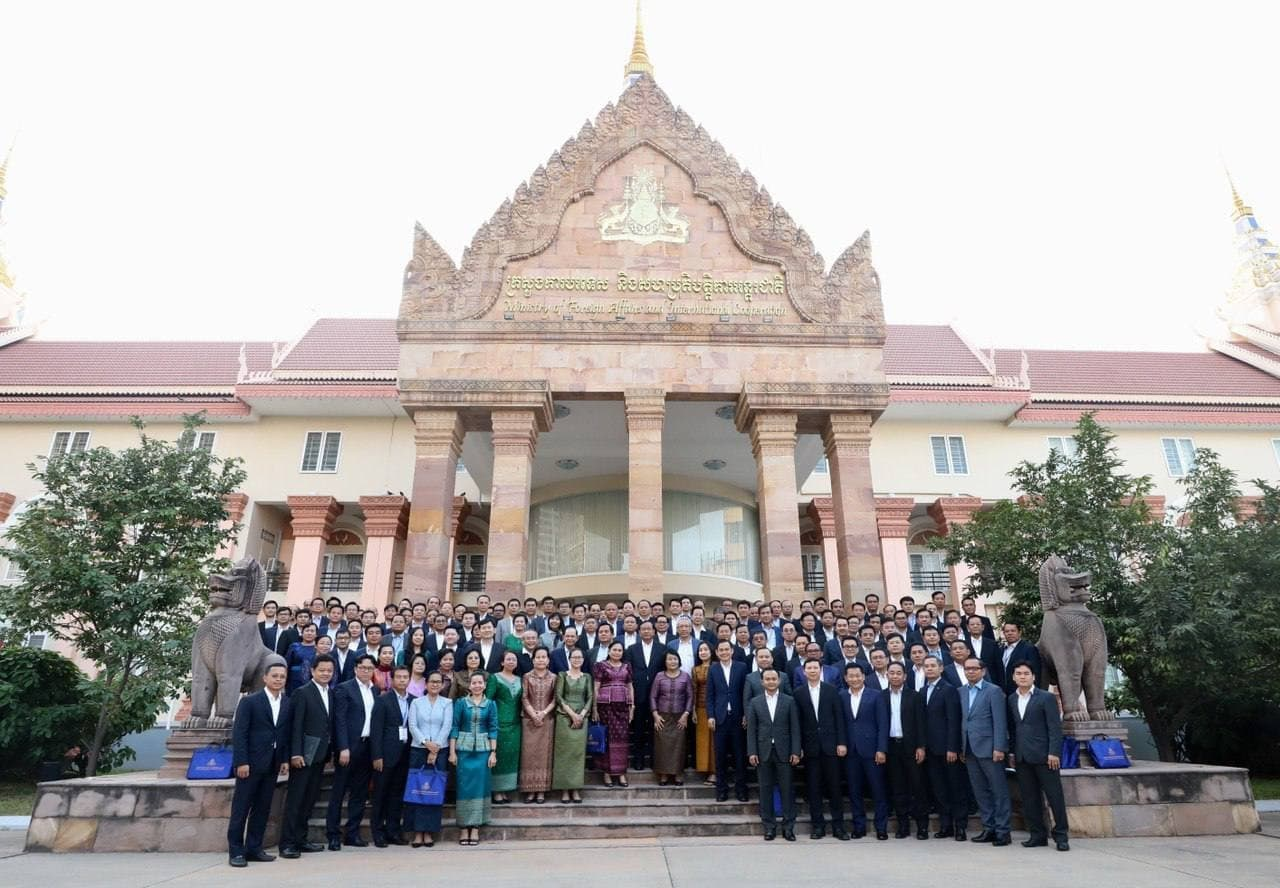Cambodia still ranks low on gender equality indexes. The World Economic Forum Global Gender Gap Report 2021 rated Cambodia 121 out of 156 assessed states. That is not only lower than its neighbors such as Vietnam which is ranked 87th, but it is also 14 places lower than in 2020. Especially regarding political participation, Cambodian women are still extremely disadvantaged, as only 21,6% of parliament members and 9,4% of ministerial positions are filled by women. Particularly when it comes to representing Cambodia as civil servants for the Ministry of Foreign Affairs (MoFA), the situation looks bleak. A glance at other nations around the world and the rising popularity of the concept of Feminist Foreign Policy stresses the urgency for change and the potential gender-mainstreaming across all ministries and policies offers. This paper will explore the origins, principles and effects of Feminist Foreign Policy and highlight good practices from countries following the approach. It will outline certain tools that could be of use to Cambodia while also including the voices of female Cambodian diplomats.
The origins of Feminist Foreign Policy
Over the recent years, Feminist Foreign Policy has become somewhat of a trend in the Global North. Sweden became the first country to announce its Feminist Foreign Policy in 2014, followed by other countries such as Canada in 2017, Mexico in 2020 and most recently Germany in December 2021, which also appointed Annalena Baerbock as its first female foreign minister. The concept of a Feminist Foreign Policy originates from the UN 1325 Resolution on Women, Peace and Security, which amplifies the conviction that sustainable peace, security and development depends on and requires the participation and inclusion of women and their concerns and interests as well as full gender equality. Figures such as former Swedish foreign minister Margot Wallström as well as Think Tanks like the Centre for Feminist Forein Policy have been on the forefront of promoting the relevance and applicability of the approach.
What is a Feminist Foreign Policy?
Feminist Foreign Policy acknowledges the central and specific role women play in creating peaceful and secure societies and the necessity to empower women in order to eradicate poverty and inequalities within and between countries. For instance, Sweden and Germany orient their policy among three R’s: Rights, Representation and Ressources. In practice this means that the
countries advocate and work towards women and girls having the same legal means, are equally represented in political decision making processes on local, national and international level, and can access the same amount of resources such as education or finances as men and boys. Therefore, a Feminist Foreign Policy does not only create ways for women to participate in international politics, bi- and multilateral negotiations, but also focuses its policies across all sectors on the empowerment of girls and women. This could for instance mean that development cooperation projects are mainly focused on promoting the rights of women and girls and that economic diplomacy is emphasizing the inclusion and growth of women to empower them to have access to equal resources. In the following, the three R’s of Feminist Foreign Policy and their application will be explored further and applied to the Cambodian context.
Representation of Interests and Perspectives
One of the key pillars of Feminist Foreign Policy is to increase the representation and thus participation of women in politics and foreign affairs. This rests on the conviction that without female representation, the inclusion of half of the world's perspectives, concerns and demands is not fully recognized in policy making and negotiations. Countries that pursue a Feminist Foreign Policy are therefore eager to have an equal representation of men and women in their diplomatic corps. For example, after a study revealed that only 25% of German embassies are led by women, Germany’s previous government already started to improve the position of women in foreign policy. Although the recruitment rate of women for the foreign service is already a little over 50 per cent, further measures to improve the position of women in foreign policy included the introduction of quotas for delegations, events and cooperations. Sweden is already further ahead as it is leading the Women in Diplomacy Index 2021 with 48,1% of it’s ambassadors being female while Mexico has pledged to reach gender equality in its foreign service by 2024.
The number of Cambodian female diplomats must grow and be accompanied by social change
Despite some improvements, female voices and concerns remain far from being equally represented in Cambodia’s foreign policy. “There are still people – both men and women - who
think that the diplomat job is a man's job,” Mrs. Pech Puthisathbopeaneaky says. When she was appointed as Cambodia’s General Consul to Hong Kong in March 2021, only four of Cambodia’s Embassies were led by women. This increased to five and thus 15% with the appointment of H. E. Chring Botum Rangsay as Ambassador to South Korea in September 2021. Among structural disadvantages, this also is based on the social expectations resting on women to fulfill most unpaid care work and to take care of children, tasks which seem incompatible with working in a high ministerial job and the potential of being posted overseas. This is also affirmed by Ms. Pech. According to her, female “talents are often doubted, ignored, and underestimated just because we are women. We have to fight against this conception.” Many studies have underscored the importance of including women in international negotiations. For instance, a UN Women study revealed that women’s participation in peacebuilding increases the probability that a peace agreement will last for at least 15 years by 35 percent. In conjunction with this H.E. Mrs. Savny Phen, Cambodia’s Ambassador to Germany states: “Beside the ability and competency of women, they are natural diplomats. In terms of the art of negotiation, I think that most women have great potential to lead the discussions in a calm and collected manner while showing the greatest of patience - a very important aspect during negotiations.” Ms. Pech also agreed to this as she states “I think being a woman and being a diplomat share similar, if not the same, characteristics and those are empathy, peacefulness and persuasiveness. As women, we tend to understand and share feelings with one another more easily. Also, our patience and willingness to listen often make us as great communicators, facilitators, and negotiators in particular, for conflict resolutions. Last but not least, attention to details keep us analytical and flexible in all situations.” As Ms. Pech rightly outlines, women have all the necessary capacities to create lasting peace and stabilize societies on and off the diplomatic floor. Therefore, increasing the representation of women in foreign affairs also has the potential to create lasting societal change within Cambodia and to improve its role as a negotiator for peace.
Resources and Rights through Economic Diplomacy
Nevertheless, Feminist Foreign Policy is about more than increasing female representation in foreign policy. It’s about gender-mainstreaming all parts of foreign policy to also improve the rights and access to resources of women and girls around the world. Hence, another key pillar of Feminist Foreign Policy is gender-mainstreaming development cooperation as well as international trade policies and economic diplomacy. Particularly when it comes to economic development, women and gender-equality play a crucial role. In fact, reaching gender-equality would increase global wealth, by around US$12 trillion within a decade. Countries that follow
a Feminist Foreign Policy are eager to reach this goal, as for instance Canada pledged that 95% of its development cooperation budget promotes gender-equality and Sweden helped to develop the UNCTAD Trade and Gender Toolbox, a guide which can be used by governments to assess its policy plans through a gender lense. Additionally, the Swedish Action Plan 2019-2022 is working towards gender-mainstreaming its trade policies and international trade agreements to ensure that they benefit and empower female producers, entrepreneurs and employees. This is important because although free trade agreements have the potential to boost the export and GDP of participating states, they often unproportionately force women to remain in the informal sector or retreat to unpaid care work because they no longer can compete with foreign players or new actors entering their domestic market. This makes gender-mainstreaming economic diplomacy especially significant for least- and developing countries and such countries should be eager to cooperate in this field.
Cambodia needs a feminist economic diplomacy
Some female-dominated economic sectors in Cambodia are not only well-integrated in global value chains and open to huge foreign investment but also part of major trade negotiations and agreements. Take for instance the garment sector where 90% of employees are women and which constitute 45% of Cambodia’s exports. This is just one example which particularly resonates with the demand of Feminist Foreign Policy to gender-mainstream all policies and not just to increase representation in the foreign service. One measure could be to include tools to assess the effect of potential trade policies on women in economic diplomatic training as well as to make sure that the negotiations of Foreign Direct Investment include female voices and that the adopted policies especially empower women. This could be done by integrating the UNCTAD Trade and Gender Toolbox into policy training, planning and negotiations as it provides the background for an in depth analysis of the expected consequences of trade reforms on the
economy and on women’s economic participation. Moreover, as 65% of MSMEs in Cambodia are owned or managed by women and small businesses are particularly vulnerable to foreign competition, one cannot stress enough the importance for Cambodia to include the perspectives of female employees and entrepreneurs into economic diplomacy in order to boost the economy for all members of society. This is also affirmed by H.E. Mrs. Savny Phen who states that “the main duty for diplomats is not only to focus on the enhancing of political and cultural cooperation but also to promote its own trade and economy, participating in global challenges and being involved in peace and security concerns and current world’s issues.” Thus, the tools of Feminist Foreign Policy offer huge leverage to empower women and make this a vehicle to grow the national economy and Cambodia’s position in the region and the world.
Achieving gender-equality and including women’s voices in foreign policy is not only an enrichment for society, it is a prerequisite to reach full development potential. By encouraging more women to work in foreign policy, making their perspectives heard especially in regards to economic diplomacy, international trade and peace-keeping, Cambodia would make great strides towards reaching gender-equality within its own nation but also making the world a more just place. Thus, gender-mainstreaming across all ministries and policies and increasing the number of female diplomats would be a great step in the right direction.




